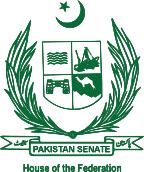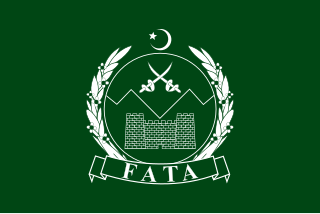Related Research Articles

The Politics of Pakistan takes place within the framework established by the constitution. The country is a federal parliamentary republic in which provincial governments enjoy a high degree of autonomy and residuary powers. Executive power is vested with the national cabinet which is headed by Prime Minister of Pakistan, who works with the bicameral parliament and the judiciary. Stipulations set by the constitution provide a delicate check and balance of sharing powers between executive, legislative, and judicial branches of the government.
The Eighth Amendment to the Constitution of Pakistan allowed the President to unilaterally dissolve the National Assembly and elected governments. The National Assembly of Pakistan amended the Constitution of Pakistan in 1985 and the law stayed on the books until its repeal in 1997.

The Constitution of Pakistan, also known as the 1973 Constitution, is the supreme law of Pakistan. The document guides Pakistan's law, political culture, and system. It sets out the state's outline, the fundamental rights of the population, the state's law and orders, and also the structure and establishment of the institutions and the armed forces. Drafted by the government of Zulfikar Ali Bhutto, with additional assistance from the country's opposition parties, it was unanimously approved by the 5th Parliament on 10 April and ratified on 14 August 1973. The first three chapters establish the rules, mandate, and separate powers of the three branches of the government: a bicameral legislature; an executive branch governed by the Prime Minister as chief executive; and an apex federal judiciary headed by Supreme Court. The Constitution designates the President of Pakistan as a ceremonial Head of State who is to represent the unity of the state. The first six articles of the constitution outline the political system as federal parliamentary republic system; as well as Islam as its state religion. The Constitution also encapsulates provisions stipulating the legal system's compliance with Islamic injunctions contained in the Quran and Sunnah.

The President of Pakistan is the head of state of the Islamic Republic of Pakistan. The president is the nominal head of the executive and the supreme commander of the Pakistan Armed Forces. The Presidency is a ceremonial position in Pakistan. The President is bound to act on advice of Prime Minister and cabinet. Asif Ali Zardari is the current President since 10 March 2024.

The Prime Minister of Pakistan is the head of government of the Islamic Republic of Pakistan. Executive authority is vested in the prime minister and his chosen cabinet, despite the president of Pakistan serving as the nominal head of executive. The prime minister is often the leader of the party or the coalition with a majority in the lower house of the Parliament of Pakistan, the National Assembly where he serves as Leader of the House. Prime minister holds office by virtue of their ability to command the confidence of the National Assembly. The prime minister is designated as the "Chief Executive of the Islamic Republic".

The Senate of Pakistan or Aiwān-e-Bālā Pākistān, constitutionally the House of the Federation, is the upper house of the bicameral Parliament of Pakistan. As of 2023, It has a maximum membership of 100, of which 92 are elected by the provincial legislatures using single transferable vote. Four represent the Federal Capital and another four are representing former Federally Administered Tribal Areas, until membership expiration in 2024. Members sit for terms lasting six years, with half of the house up for election every three years. Unlike the National Assembly, the Senate is a continuing chamber and hence not subject to dissolution.

The National Assembly of Pakistan is the lower house of the bicameral Parliament of Pakistan, with the upper house being the Senate. As of 2023, the National Assembly has a maximum membership of 336, of which 266 are directly elected by an adult universal suffrage and a first-past-the-post system to represent their respective constituencies, while 70 are elected on reserved seats for women and religious minorities from all over the country. Members hold their seats for five years or until the house is dissolved by the President on the advice of the Prime Minister. The house convenes at the Parliament House, Red Zone, Islamabad.

The Supreme Court of Pakistan is the apex court in the judicial hierarchy of the Islamic Republic of Pakistan.

The Parliament of Pakistan is the supreme legislative body of the Islamic Republic of Pakistan. It is a bicameral federal legislature, composed of the President of Pakistan and two houses: the Senate and the National Assembly. The president, as head of the legislature, has the power to summon or prorogue either house of the Parliament. The president can dissolve the National Assembly, only on the Prime Minister's advice.

The Government of Pakistan, constitutionally known as the Federal Government, commonly known as the Centre, is the national authority of the Islamic Republic of Pakistan, a federal parliamentary republic consisting of four provinces, two autonomous territories and one federal territory.

The Constitution of Bangladesh, officially the Constitution of the People's Republic of Bangladesh is the supreme law of Bangladesh. The document provides the framework that demarcates the Bangladeshi republic with a unitary, parliamentary democracy, that enshrines fundamental human rights and freedoms, an independent judiciary, democratic local government and a national bureaucracy.
The Objectives Resolution was adopted by the Constituent Assembly of Pakistan on March 12, 1949. The resolution proclaimed that the future constitution of Pakistan would not be modeled entirely on a European pattern, but on the ideology and democratic faith of Islam. The resolution, in its entirety, has been made part of the Constitution of Pakistan under Article 2(A).

The Federally Administered Tribal Areas, commonly known as FATA, was a semi-autonomous tribal region in north-western Pakistan that existed from 1947 until being merged with the neighbouring province of Khyber Pakhtunkhwa in 2018 through the Twenty-fifth amendment to the constitution of Pakistan. It consisted of seven tribal agencies (districts) and six frontier regions, and were directly governed by the federal government through a special set of laws called the Frontier Crimes Regulations.
The Eighteenth Amendment of the Constitution of Pakistan was passed by the National Assembly of Pakistan on April 8, 2010, removing the power of the President of Pakistan to dissolve the Parliament unilaterally, turning Pakistan from a semi-presidential to a parliamentary republic, and renaming North-West Frontier Province to Khyber Pakhtunkhwa. It also gave self-governing, legislative and financial autonomy to provincial authorities. The package was intended to counter the sweeping powers amassed by the presidency under former presidents General Pervez Musharraf and General Muhammad Zia-ul-Haq and to ease political instability in Pakistan. The bill reversed many infringements on the Constitution of Pakistan over several decades by its military rulers. The amendment bill was passed by the Senate of Pakistan on April 15, 2010 and it became an act of parliament when President Asif Ali Zardari signed the bill on April 19, 2010. It was the first time in Pakistan's history that a president relinquished a significant part of his powers willingly and transferred them to parliament and the office of the prime minister.
The Twenty-second Amendment of the Constitution of Pakistan, officially known as the Constitution Act, 2016, sets to amend the procedure for the appointment, qualifications and other prerequisites for the chief election commissioner (CEC) and four members of the Election Commission of Pakistan (ECP).
The Constitution Act, 2017 was a proposed amendment to the Constitution of Pakistan which called for an increase in pension payments for the widows of judges. The amendment was approved by the standing committee of the National Assembly of Pakistan in February 2017. The bill was never adopted and never became part of Constitution of Pakistan as an amendment.
The Constitution Act, 2017 was a proposed amendment to the Constitution of Pakistan aimed at restoration of delegation powers of the federal government to its officers or subordinate authorities which weren't included in the Eighteenth Amendment to the Constitution of Pakistan. The Constitution Act, 2017, introduced to the National Assembly of Pakistan sought to amend Article 90, 99, and 139 of the Constitution.
The Constitution Act, 2017, was a proposed amendment to the Constitution of Pakistan, which aimed to implement changes recommended by the Parliamentary Committee on Electoral Reforms.
The Constitution Act, 2017 was a proposed amendment to the Constitution of Pakistan which aimed to restore military courts. The amendment would be an extension of the expired Twenty-first Amendment to the Constitution of Pakistan.
The Constitution Act, 2017 was a proposed amendment to the Constitution of Pakistan seeking to create seats for the Federally Administered Tribal Areas in the Khyber Pakhtunkhwa Assembly and establish a new judicial system in the tribal belt. The amendment would have added new provisions to the Constitution to create room for FATA lawmakers in the Khyber Pakhtunkhwa Assembly after the merger of FATA and Khyber Pakhtunkhwa. The amendment was introduced to the National Assembly of Pakistan alongside the Tribal Areas Rewaj Act.
References
- ↑ "NA body on L&J defers 29th Constitution Bill, 2017". Business Recorder . Pakistan. 2017-07-27. Retrieved 2018-05-29.